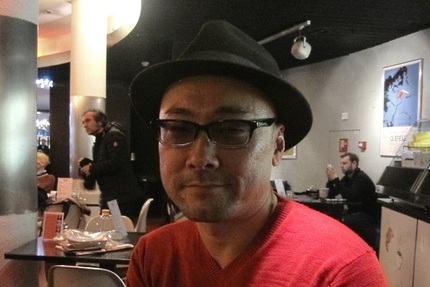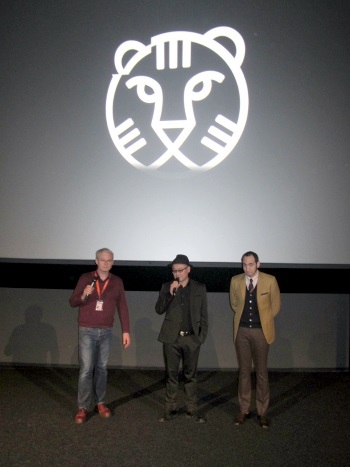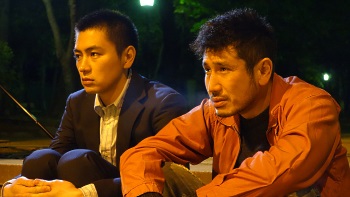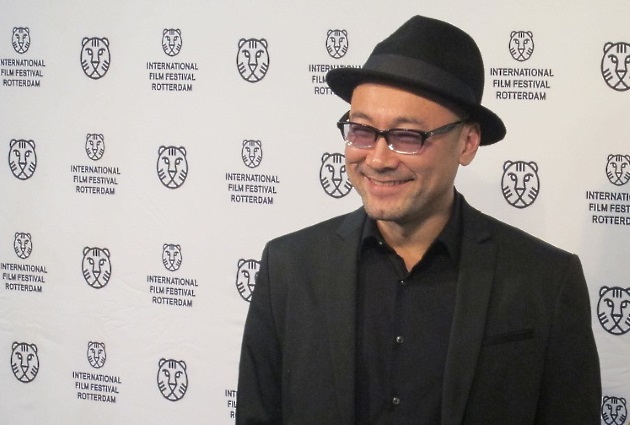Rotterdam 2016 Interview: Uchida Eiji, Director Of LOWLIFE LOVE And GREATFUL DEAD

Two days later I met its director Uchida Eiji, also famous here at ScreenAnarchy for his fine thriller Greatful Dead, and I interviewed him about Lowlife Love with producer Adam Torel present.
Note that there are some spoilers. Nothing too major, but it does close off a plot-avenue or two, and it may give you an impression which way the story goes.
ScreenAnarchy: Lowlife Love shows the seedy underbelly of Japanese no-budget independent film-making. Why did you choose this subject?
Uchida Eiji: In Japan there is a type of film which is called "Yojôhan", meaning it takes place in a small room, just large enough to fit four-and-a half tatami mattresses in. There are also quite some porn films with the word yojôhan in the title, and all these films really have no budget. The idea for Lowlife Love started when I also wanted to make a film once in such a confined space.
You liked the limitations this put upon you?
It's not that. Today there are still a lot of these films being made, mostly with no money whatsoever. But the makers of these films often have a lot of pride, even more so than filmmakers working on regular films. This contrast interested me.
 As you explained during the Q&A, the amount of misogyny in that part of the industry is shocking. Abuse happens everywhere in the world in film industries, but in Japan it is almost considered normal. Is that something you wanted to denounce?
As you explained during the Q&A, the amount of misogyny in that part of the industry is shocking. Abuse happens everywhere in the world in film industries, but in Japan it is almost considered normal. Is that something you wanted to denounce?
I didn't really have a feeling like "I must denounce this", but I wanted to show it like it is, even though the film is not a documentary. What is shown is pretty close to reality, also because a large part of it is directly based on stories and anecdotes told to me by actors.
You spent a large part of your youth outside of Japan. In the Q&A you said you always think of the domestic Japanese audiences and the international audiences as two different entities. Do you still see yourself as a bit of a non-Japanese outsider?
I lived in Brazil for the first twelve years of my life, and that has always influenced me. I've always been Japanese, but as a kid I basically knew nothing of Japanese culture. It has shaped me in such a way that I always have had a bit of an outsider's view on Japan. And it is not like I feel an urge to exhibit or explain Japanese culture to the rest of the world in my films, but I do always show it like I see it.
Do you think this non-Japanese viewpoint works to your advantage, or dis-advantage? Does it provide you with additional insight?
Yes, I think it is an advantage. Take the misogyny in Lowlife Love, and the position of women in daily life. Most people who are born and raised in Japan wouldn't notice it as anything out of the ordinary. They'd see this film and consider it to be almost normal. But someone viewing this from outside that culture will most likely offer a much stronger opinion.
In an older interview you once mentioned that during your time in Brazil, you had lots of contact with the Catholic church, and indeed this plays an important part in the story of your previous film Greatful Dead. But I noticed you also feature a church in Lowlife Love as well, as a meeting place for some of the characters. Is the church important to you?
 When I lived in Brazil as a ten-year-old, everybody around me was Catholic. I'm not a Catholic myself, and I wasn't one at that time, but when I moved to Japan as a teen, suddenly everybody around me was Buddhist. And that was a very big change for me, it was something completely different. Even though I'm not of the Catholic faith myself, I'm very familiar with it, and it has always interested me.
When I lived in Brazil as a ten-year-old, everybody around me was Catholic. I'm not a Catholic myself, and I wasn't one at that time, but when I moved to Japan as a teen, suddenly everybody around me was Buddhist. And that was a very big change for me, it was something completely different. Even though I'm not of the Catholic faith myself, I'm very familiar with it, and it has always interested me.
Adam Torel mentioned he had quite a few deleted scenes, as the film went through several different versions during the editing stage. Was there a version where the church had a bigger role in the story?
It was never that important to the story, so the difference isn't that huge, but we probably cut half of the church scenes. In total, we shortened the entire film by 30 minutes in its editing phase.
A big part of what we cut had to do with the character of Kyoko, who in the original version ended up committing suicide. In the final version she ends up a bit happier. There are also two versions of the very last scene, and one is a too-happy ending we didn't use.
Adam Torel interjects: We'll put that on the DVD! [we all laugh]
Uchida Eiji: What happened with that final scene was, we weren't entirely happy with some of these characters just walking away, we wanted something with a bit more impact. So on the fly we rented a car and some people, bought some balaclavas and baseball bats, and we shot the current ending.
That was all improvised on the spot?
Yes, and that is the big advantage of independent filmmaking! Making a change like this would have been impossible on a regular Japanese production, one for the bigger studios. In the past, when I worked on big commercial projects, I already got into big trouble when I changed a single word in the script. The assistant producer went like... [acts out total and utter dumbstruck shock, we all laugh].
He reprimanded me and told me to remember that such changes need to be approved by all the scriptwriters. In Japan, you always need to address the scriptwriter as "Sensei", the honorific for teacher, master. And that was for ONE WORD! You can imagine what changing the ending would have been like.
In the film, I got the impression that Ken was the character we, the audience, were supposed to identify with the most. I also noted that Ken is a writer, and has lived for years outside of Japan. Is he a personification of you?
Ken is indeed what I'd consider to be the most "normal" of the characters. I never really thought about if he's like me or not. But you see a lot of people like him in the movie business, beginning writers who want to be future scriptwriters.
You said a lot of the film is based on true stories and anecdotes. In these no-budget films, actresses will do anything to get a part. What is the worst you've experienced yourself?
 [laughs, then thinks...]
[laughs, then thinks...]
Well... thankfully, most of the more extreme stories you see in Lowlife Love are based on other people's anecdotes. It's a good thing I never experienced these myself, otherwise I might have been in jail by now. [we all laugh]
One thing I do remember, and what I was shocked by, was visiting a film festival where I met three hugely revered Japanese directors, all in their seventies and eighties. Later, when I went to a bar, they were there too, but this time they were surrounded by a group of actresses, draped over them as if they were ehm... hostesses.[we all laugh]
Lowlife Love is about an environment you're familiar with, but Greatful dead was completely different, a great genre film. What would your dream project be, if someone handed you 100,000,000 dollars?
A yakuza film! I'd love to do a human drama taking place in that world, like The Godfather, but I'd need a gigantic budget for that.
Should I think about something akin to Battles Without Honour and Humanity?
Oh, I'm a big fan of Fukasaku Kinji!
Mentioning budget... you said the independence you had on Lowlife Love was very important, and that film was partly financed through crowd-funding. What was your experience with that?
The Kickstarter campaign went so well that I ended up really liking it. It wasn't my idea, I thought it was a bit weird and I wasn't expecting much of it to be honest. In Japan, crowd-funding is mostly an unexplored area. But we had a great experience with it. And not just because we got money, but also because we got it from fans of the project, who were happy with all the information we gave them, and helped spread it, creating publicity. Yes, we were really pleased with the crowd-funding.
Apart from dream projects, do you have a new film in the pipeline?
Yes, and we'll start in May. It's something completely different from my previous films, as this one will be a true story. It's about teenagers, and the main character is a girl who's run away from home at a very young age, and who gets involved with the shadier parts of society.
The no-budget film industry again?
No no no, things like prostitution and such.
Thank you very much for this interview.
Note: here is a special thanks to Adam Torel and the IFFR Press desk for their help in setting up this interview, and especially interpreter Dick Stegewerns who made it possible for us not to rely on just very short sentences.
Picture note: the big picture at the top was taken during the interview. The picture halfway up the page shows the introduction at the International premiere in Rotterdam, and from left to right you see Dick Stegewerns, Uchida Eiji and Adam Torel. The picture below is Mister Uchida, minutes before the premiere.


Do you feel this content is inappropriate or infringes upon your rights? Click here to report it, or see our DMCA policy.






